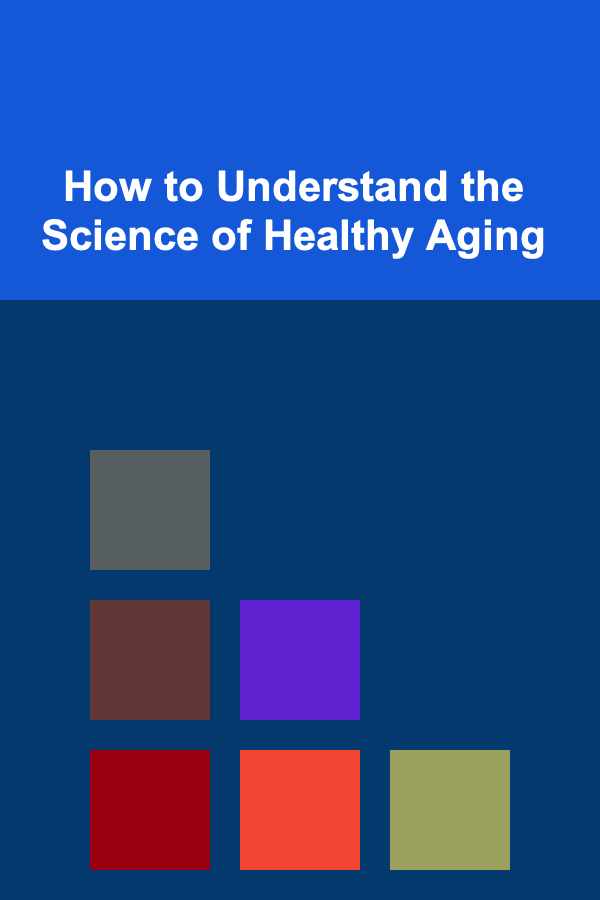
How to Understand the Science of Healthy Aging
ebook include PDF & Audio bundle (Micro Guide)
$12.99$5.99
Limited Time Offer! Order within the next:

Aging is a natural part of life that brings about changes in both the body and the mind. While aging cannot be avoided, the way in which we age can be influenced by a variety of factors. In recent years, the science of aging has gained tremendous attention, as researchers explore how we can not only live longer lives but also ensure that those years are healthy, active, and fulfilling. Healthy aging involves maintaining both physical and mental well-being throughout the aging process. It is no longer about simply avoiding age-related diseases but about optimizing quality of life as we grow older.
In this article, we will explore the science of healthy aging, looking at the biological, psychological, and social factors that contribute to the aging process. We will also discuss practical strategies for promoting healthy aging, based on the latest scientific findings.
The Biology of Aging
Understanding the biology of aging is crucial in order to comprehend how to age healthily. Aging is influenced by a variety of biological processes that affect cells, tissues, and organs. Some of these processes are inevitable, but many can be mitigated through lifestyle choices and medical interventions.
1.1 Cellular Aging and Senescence
At the cellular level, aging is largely a result of accumulated damage over time. Cells are constantly exposed to environmental factors such as UV radiation, pollution, and chemicals, which can cause DNA damage. Over time, this damage accumulates, leading to dysfunction in cells and tissues. As a result, cells begin to lose their ability to divide and function properly. This phenomenon is known as cellular senescence.
Senescent cells no longer contribute to the body's ability to repair or regenerate, and they can release harmful substances that cause inflammation. This contributes to many age-related diseases, such as arthritis, cardiovascular disease, and neurodegeneration. One of the key areas of research in aging science is understanding how to prevent or reverse cellular senescence. Scientists are studying various molecules, including senolytics, which can target and remove senescent cells, in the hope of slowing or even reversing the aging process.
1.2 Telomere Shortening
Telomeres are protective caps located at the ends of chromosomes. Each time a cell divides, the telomeres shorten slightly. Over time, as the telomeres continue to shorten, cells become less able to divide and repair themselves. When telomeres become too short, cells enter a state of senescence or die. This process is closely linked to aging, as it reduces the regenerative capacity of tissues and contributes to the development of age-related diseases.
Some researchers are exploring ways to extend the lifespan of telomeres, with the hope of slowing the aging process. Telomerase, an enzyme that can help rebuild telomeres, is one potential avenue of research. However, it is still unclear whether telomere extension can be safely and effectively used to promote healthy aging.
1.3 Mitochondrial Dysfunction
Mitochondria are the powerhouses of the cell, responsible for producing energy. As we age, the efficiency of mitochondria declines, leading to a decrease in energy production and an increase in oxidative stress. This process is thought to play a major role in aging and age-related diseases. The accumulation of damaged mitochondria is associated with conditions such as Parkinson's disease, Alzheimer's disease, and cardiovascular diseases.
Research in this area focuses on understanding how to improve mitochondrial function as we age. One approach is mitophagy, the process by which damaged mitochondria are removed from the cell. Enhancing mitophagy could help reduce the accumulation of dysfunctional mitochondria and improve overall cellular health.
The Psychological Aspects of Aging
In addition to the biological changes associated with aging, mental health and cognitive function play a crucial role in the overall quality of life as we age. The psychological aspects of aging encompass emotional well-being, cognitive function, and mental resilience.
2.1 Cognitive Decline and Dementia
One of the most feared aspects of aging is cognitive decline, which can range from mild forgetfulness to more severe conditions like dementia. Alzheimer's disease is the most common form of dementia, affecting millions of people worldwide. While some cognitive decline is a normal part of aging, it is important to differentiate between normal age-related changes and pathological conditions such as dementia.
Recent research has shown that cognitive decline can be influenced by a variety of factors, including genetics, lifestyle choices, and environmental factors. Physical exercise, mental stimulation, and a healthy diet can all help maintain cognitive function and reduce the risk of dementia.
For example, research has found that regular physical activity promotes the growth of new neurons in the brain and improves brain plasticity. This can help protect against cognitive decline and even reverse some of the changes associated with aging. Mental exercises, such as learning new skills, solving puzzles, and engaging in social activities, can also stimulate brain activity and promote cognitive health.
2.2 Emotional Well-Being and Mental Health
Emotional well-being is another critical component of healthy aging. Older adults often face significant life changes, such as retirement, loss of loved ones, or declining health. These transitions can lead to feelings of loneliness, depression, and anxiety. However, studies have shown that older adults tend to experience higher levels of emotional regulation and resilience, with many reporting an overall increase in life satisfaction in later years.
Positive psychology, which focuses on enhancing well-being rather than simply treating illness, is a growing area of research in aging. Researchers have found that older adults who engage in activities that promote a sense of purpose, such as volunteering or mentoring, experience better mental health outcomes. Cultivating positive emotions and maintaining strong social connections can also protect against depression and other mental health issues in older age.
Social and Environmental Factors
In addition to biological and psychological factors, the social and environmental context in which we age plays a significant role in our overall health and well-being. Social support, access to healthcare, and living conditions all influence how we age.
3.1 Social Support and Relationships
Strong social connections are associated with better physical and mental health outcomes in older adults. Social isolation, on the other hand, is linked to a higher risk of depression, cognitive decline, and even mortality. Studies have shown that older adults with close relationships and social networks tend to have better immune function, lower blood pressure, and a reduced risk of chronic diseases.
Maintaining friendships, participating in community activities, and staying connected with family members can all help promote healthy aging. The quality of social relationships is more important than the quantity, with positive, supportive relationships having the most significant impact on well-being.
3.2 Access to Healthcare
Access to healthcare is another critical factor in aging healthily. As we age, we become more susceptible to chronic conditions such as heart disease, diabetes, and arthritis. Regular check-ups and preventive care are essential for managing these conditions and maintaining a good quality of life.
Recent advancements in healthcare, including telemedicine and personalized medicine, offer new opportunities for older adults to receive timely care and manage their health more effectively. Preventive measures, such as vaccinations, screenings, and health education, can help reduce the burden of age-related diseases and improve long-term outcomes.
3.3 Environmental Factors
Environmental factors, including the places where we live, play a significant role in how we age. Air quality, access to green spaces, and urban design all affect our health and well-being. For example, studies have shown that exposure to air pollution can accelerate aging and increase the risk of cardiovascular and respiratory diseases.
Designing cities and communities that promote physical activity, social engagement, and access to healthcare is essential for supporting healthy aging. Walkable neighborhoods, public transportation, and community centers can all contribute to a higher quality of life for older adults.
Practical Strategies for Healthy Aging
Now that we have explored the science of aging, it's time to consider practical strategies for promoting healthy aging. Based on the current research, here are several evidence-based practices that can help optimize health and well-being as we age.
4.1 Regular Physical Activity
Physical activity is one of the most important factors in healthy aging. Exercise has been shown to improve cardiovascular health, maintain muscle strength, enhance cognitive function, and reduce the risk of chronic diseases. The American Heart Association recommends at least 150 minutes of moderate-intensity aerobic activity or 75 minutes of vigorous-intensity activity per week, along with muscle-strengthening exercises at least two days per week.
4.2 Nutrition and Diet
A balanced diet rich in fruits, vegetables, whole grains, lean proteins, and healthy fats is essential for healthy aging. Proper nutrition supports immune function, maintains bone health, and reduces the risk of chronic diseases. Additionally, certain nutrients, such as antioxidants and omega-3 fatty acids, have been shown to have anti-aging properties.
4.3 Mental Stimulation
Engaging in mentally stimulating activities can help maintain cognitive function and delay the onset of dementia. This can include activities such as reading, playing musical instruments, learning a new language, or solving puzzles. Staying mentally active also helps improve mood and emotional well-being.
4.4 Stress Management
Chronic stress is a major contributor to aging and age-related diseases. Learning to manage stress through techniques such as mindfulness, meditation, deep breathing, and yoga can help protect the body from the damaging effects of stress. Regular relaxation and self-care practices are essential for maintaining mental and physical health.
4.5 Social Engagement
As we age, it is important to stay socially active and maintain strong relationships. Regular social interaction promotes emotional well-being, reduces the risk of depression, and improves cognitive function. Volunteering, joining clubs, and participating in community events are excellent ways to stay engaged.
Conclusion
The science of healthy aging is a complex and evolving field that encompasses biological, psychological, and social factors. While aging is inevitable, it is possible to influence how we age through lifestyle choices, medical interventions, and environmental factors. By maintaining a healthy diet, engaging in regular physical activity, staying mentally and socially active, and managing stress, we can age with vitality and resilience. Ultimately, the key to healthy aging lies in a holistic approach that supports both the body and the mind.

How to Improve Your Ultimate Economy in Team-Based Games
Read More
How to Repurpose Household Items for Organizational Tools
Read More
How to Soundproof a Child's Room for Quieter Play
Read More
The Ultimate Guide to Thrifty Gift-Wrapping Ideas for Every Occasion
Read More
How to Optimize Your Nutrition for Brain Health
Read More
10 Tips for Leading Without Authority as a Product Manager
Read MoreOther Products

How to Improve Your Ultimate Economy in Team-Based Games
Read More
How to Repurpose Household Items for Organizational Tools
Read More
How to Soundproof a Child's Room for Quieter Play
Read More
The Ultimate Guide to Thrifty Gift-Wrapping Ideas for Every Occasion
Read More
How to Optimize Your Nutrition for Brain Health
Read More